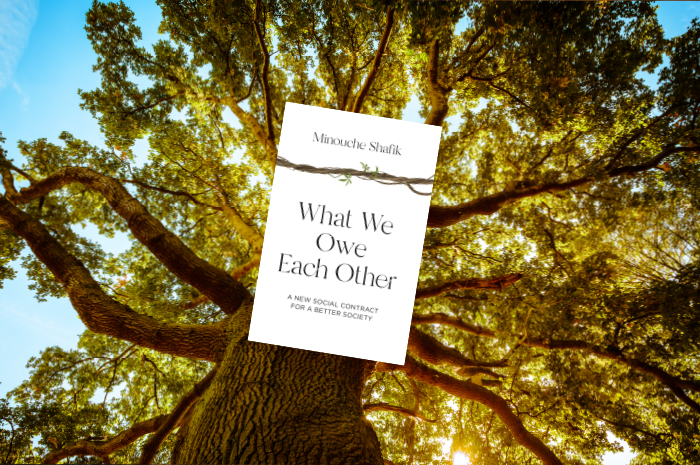
Common Denominator
A noted economist makes a persuasive case for investing in programs and infrastructure that enable people to thrive, not just survive.
Review by Robin Tatu
What We Owe Each Other: A New Social Contract for a Better Society
By Minouche Shafik.
Princeton University Press, 2021.
233 pages.
As Congress and communities nationwide debate funding for initiatives ranging from childcare and paid family leave to environmental protection, economist Minouche Shafik provides compelling insights—and data—on the merits of providing a wide swath of social programs. Societies profit from supporting their members not merely as an act of charity but as an investment in the group’s welfare, argues the author, director of the London School of Economics since 2017 and a former Princeton University faculty member. A strong safety net helps secure a more stable present and a prosperous future for everyone. “The way a society is structured has profound consequences for the lives of those living in it and the architecture of opportunity they face,” Shafik maintains. “Our obligation to each other is a fair shot at prosperity and mutual accountability.”
The book opens with an examination of how nations, particularly in Europe, have understood and implemented the social contract in the past. We hear from philosophers such as Hobbes, Locke, and Rousseau and learn that in 1889, Otto von Bismarck, founder and first chancellor of the German Empire, instituted the world’s first compulsory health insurance. We also discover that, until recently, China lacked public health care and still imposes no wealth tax.
Shafik underlines the urgency for nations to reevaluate assumptions and upgrade their frayed social contracts to meet twenty-first-century challenges, including demographic shifts. The influx of women to the workplace, for example, has increased their earnings while complicating caregiving for children and sickly or elderly family members—a role traditionally expected of wives and daughters. At the same time, well-paying manufacturing jobs worldwide continue to disappear as automation expands, leaving more people under- or unemployed and financially vulnerable. The recent pandemic has further exposed serious shortcomings of social safety nets, from the number of workers needing unemployment benefits to the increasing unaffordability of higher education. Meanwhile, climate change is endangering and complicating lives globally.
To advance, nations must grapple with these disturbing trends, and governments, businesses, and individuals all have a part to play. What We Owe Each Other offers no set solutions but rather “a menu of alternatives” that Shafik believes are achievable—though not without difficulty, debate, and compromise. Six chapters explore core areas of social concern: children, education, health, work, old age, and generations. Some of the author’s points will be familiar, such as research that demonstrates better academic and behavioral outcomes for children whose mothers return to work. Others are more contentious, including a proposed overhaul of the tax system by raising corporate rates and reducing payroll taxes via government-supported unemployment benefits, pensions, parental leave, and retraining credits. Individuals also need to do more for the group, Shafik argues. As life expectancy continues to rise, people must delay retirement, extending their productive working years and contributions to society. The final chapter addresses environmental concerns. Readers are prompted to consider what we owe our children and grandchildren, who will inherit a planet damaged by the unwillingness or inability of their forebears to act. Wales, where a “minister for future generations” monitors government policies in areas such as transport, energy, and education, offers a potential advocacy model.
Throughout the book, Shafik’s perspective as an economist frames her arguments. “Investment in children’s early years is one of the most cost-effective ways of producing an educated labour force capable of acquiring new skills,” she writes. Such funding also increases citizens’ stability, health, civic contributions, and earnings. The author recognizes that public policy is a long, often contentious process that can yield unanticipated or unintended consequences. Nonetheless, engagement remains the way forward: “The best way to predict your future is to create it,” Shafik quotes Abraham Lincoln as saying. Though readers may not agree entirely with her positions, the research she cites is clear, unambiguous, and informative. Engineers and academics interested in the political, structural, and public-policy influences that shape their work will find value in What We Owe Each Other.
Robin Tatu is Prism‘s book editor.
© Amazon/Getty Images/Alexander Da Silva